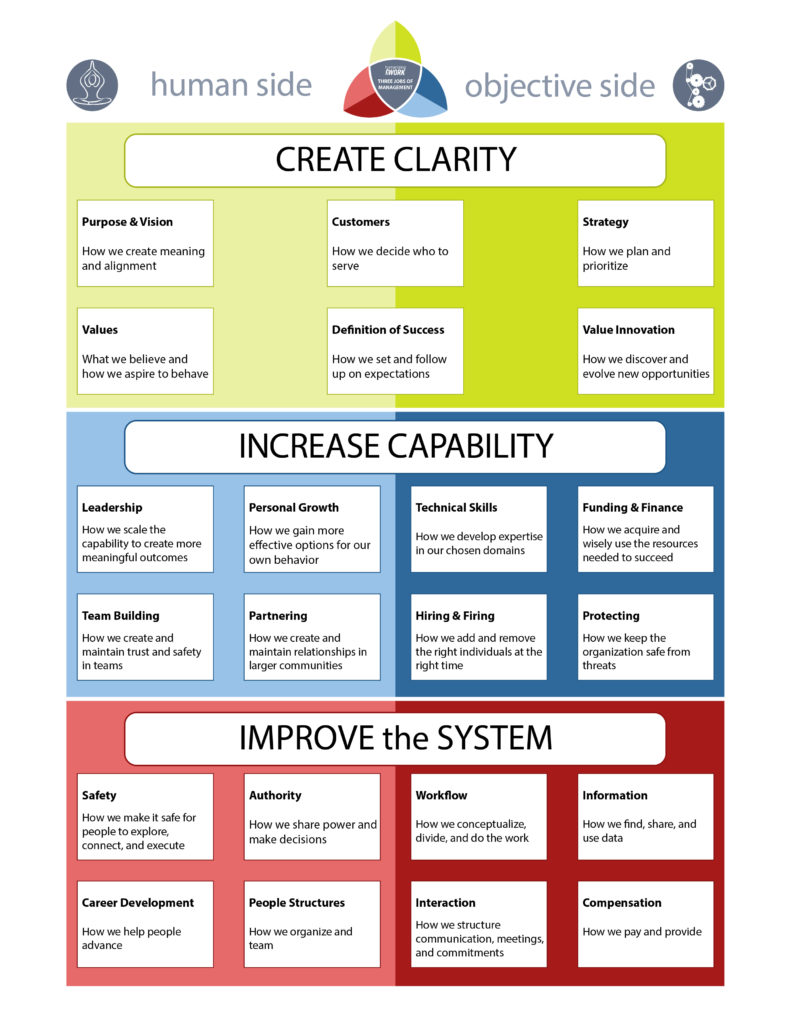In organizations that empower teams and individuals, what is the role of managers? It turns out, they have three critical jobs.
Modern companies have recognized the benefit of moving decisions about work closer to the teams and individuals executing it. We are in the midst of a world-wide re-examination of how we approach work. Even the U.S. Surgeon General describes the shift that is needed:
Movements like Agile, Beyond Budgeting, and Reinventing Organizations are all examples of this shift, and in each of these, there is a key question: what does this shift mean for managers? For all of these managers, we need a modern definition of the role, because there are certain things empowered teams need in order to be effective.
Even in organizations where the traditional job title and reporting structure of managers have been removed completely, like Morning Star, Buurtzorg, Geonetric, and Valve, the jobs of management still need to happen.
The Three Jobs of Management
Managers support and enable self-organizing, high-performing teams. How? By doing three jobs, each of which has a human side and an objective side:
- Create Clarity — what are we trying to do together and what does success look like?
- Increase Capability — how can we maximize the resources we can apply towards that end?
- Improve the System — how can we apply that capability towards that end more and more effectively?
Here’s an illustration of those three jobs with several focus areas under each one:

On any given day, a particular manager may focus on just a few of these, but together these generate a sort of “management dashboard” that orients the new day-to-day work of managers.
New Skills Required
A manager who’s used to being the expert on the work, who’s used to directing the details of the work for a team, can feel out of their depth looking at this list of focus areas. Modern management really is a different job.
For example…
- Coaching for growth, which means knowing when to give advice, when to share a concept or model, when to ask a powerful question—and how to do each of those well
- Facilitating great team meetings, the kind where the team discovers something new and comes to an aligned outcome
- Setting goals and following through with accountability, but without micromanaging
- Communicating effectively with other managers and stakeholders
It’s not command and control. Nor is it hands-off. It’s a different way of engaging to create clarity, increase capability, and improve the system.
Digging In
The three jobs of management are simple to explain, but doing them well requires a deep understanding of those jobs and the development of new habits. Each organization, team, and manager will need to apply them in their own context.
If you are…
- …frustrated that management feels handwaved in organizations,
- …unsure how to contribute to building and maintaining high-performance teams,
- …wishing for clearer ways to communicate to stakeholders about what teams are up to, or
- …looking to grow your ability to get the best from the people in your organization,
… the three jobs of management provides a human-centered, business friendly approach to the role. Management has a tarnished reputation in many organizations, and it is not a result of a lack of good intent, hard work, and trying to do the right thing.
For a century, we’ve been taught to direct and control. Want to develop your capability to be a different kind of manager, one that creates the conditions for self-organizing teams to thrive?
Our Three Jobs of Management series goes deep into the key jobs and skills of effective management. Designed as a series of workshops with practice in between, each workshop introduces a new key skill in effective management for empowered organizations. Click below and join the mailing list to hear about upcoming workshop offerings.
Waitlist me for future offerings
